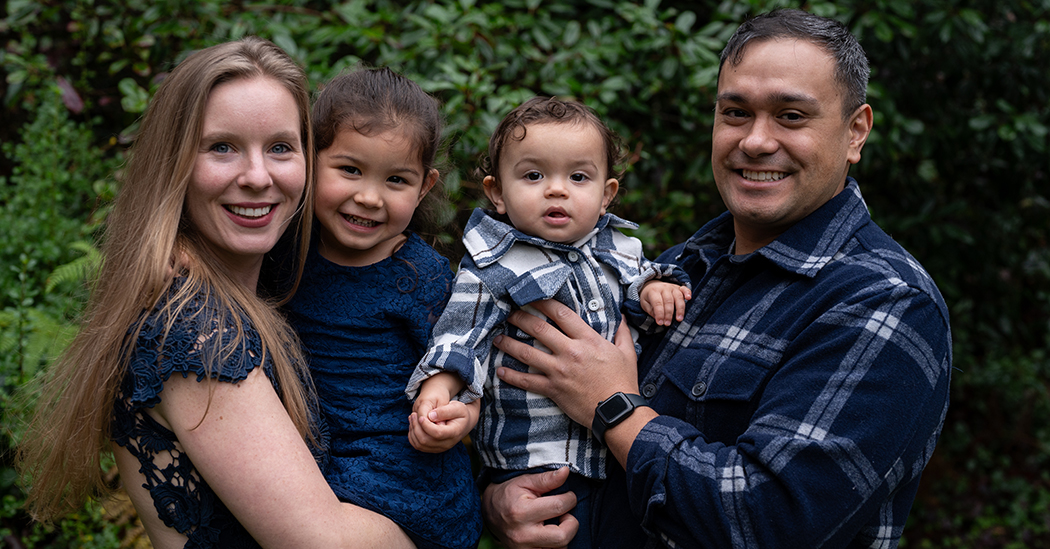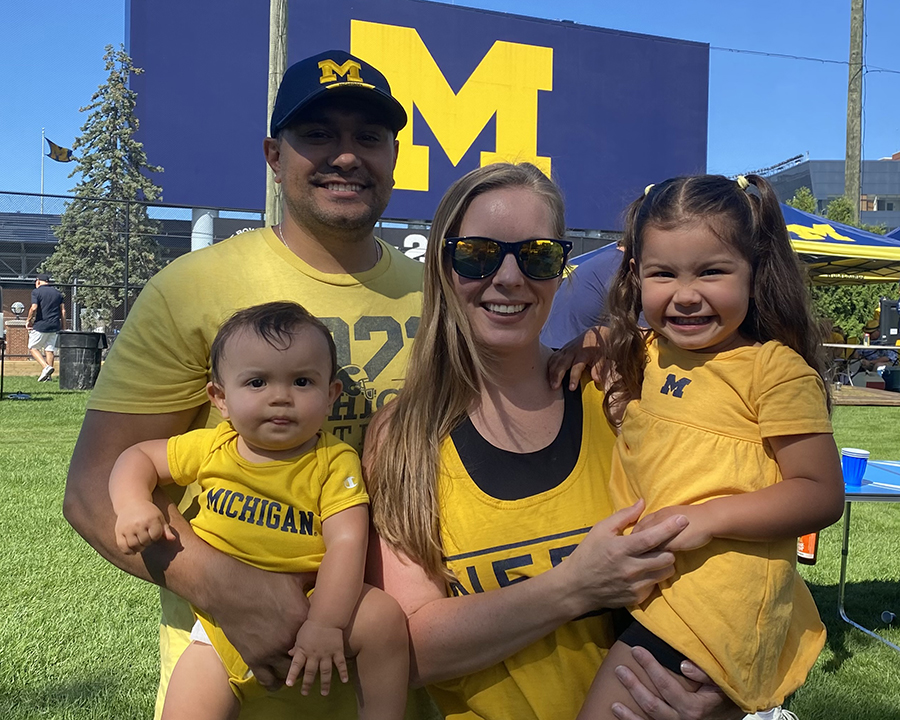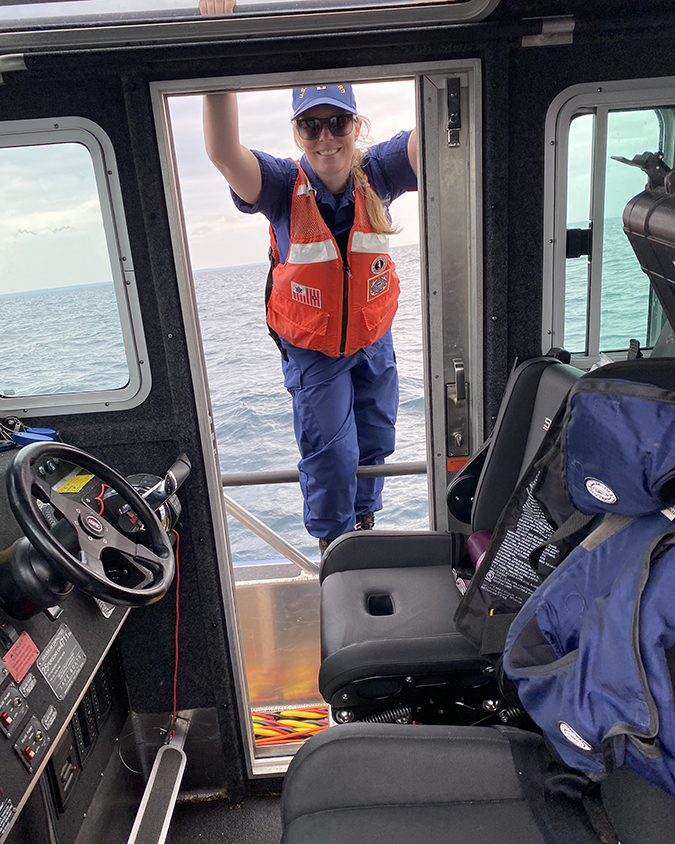US Coast Guard officer navigates path to public health

Katie Romas, MPH ’25
Environmental Health Sciences with a concentration in Industrial Hygiene
Inspired by her father, a US Navy veteran, Katie Romas, MPH ’25, knew from a young age that she wanted to follow in his footsteps. Or rather, his wake.
“He’s my hero,” said Romas, who grew up in Silverdale, Washington, across the Puget Sound from Seattle. “I always wanted to do exactly what he did.
“When I wanted to join the Navy, he was sort of steering me toward the Coast Guard or Air Force. When I was looking into the Coast Guard, I really liked their environmental mission—it’s more humanitarian. Protecting people is always first, but the environment is a close second priority. I really enjoyed that aspect of it.”
Romas attended the Coast Guard Academy, studying Marine Environmental Sciences. The program prepared her well with rigorous coursework in math, physics and nautical science, but it was her experiences as a response officer that crystallized her passion for public health.
Working with the Coast Guard’s Incident Management Assist Team, Romas tackled real-world challenges, ranging from hurricane response to oil spills.
PROSPECTIVE STUDENT? Learn more about Michigan Public Health.
When I was looking into the Coast Guard, I really liked their environmental mission—it’s more humanitarian. Protecting people is always first, but the environment is a close second priority. I really enjoyed that aspect of it.”
These situations required her to coordinate efforts with other agencies, writing safety plans and minimizing environmental impact. She often found herself impressed by the work of industrial hygienists, the specialists who ensure the safety of responders and subsequently the environment during emergencies.
This exposure sparked her interest in understanding the science behind public health.
Feeling ready to further her education, Romas applied for the Coast Guard’s Advanced Education Program. After being granted approval, she had the opportunity to choose her field of study.

While her initial interest was in industrial hygiene—a field merging science with public health—her eyes were soon opened to the broader impact of public health.
The University of Michigan School of Public Health Department of Environmental Health Sciences offered exactly what she sought in earning a Master of Public Health with a concentration in Industrial Hygiene—a holistic approach that combined technical knowledge with real-world application.
With passionate faculty such as Rick Neitzel, professor of Environmental Health Sciences and Global Public Health, who quickly responded to her inquiries, and a curriculum saturated with opportunities for interaction and engagement, Romas knew Michigan Public Health was the place for her.
Neitzel’s dedication and insight into how earning an MPH prepares professionals for fieldwork—not research alone—convinced her she was on the right path.
“When Dr. Neitzel told me that the MPH was really for people who are going to be out there practicing and using the skills and interfacing with the public, I was like, ‘This is what I want. I want to learn from teachers like him because he clearly knows and loves what he’s doing,’” she said.
Romas’ education was further enriched by her involvement with the Center for Occupational Health and Safety Engineering (COHSE) at Michigan. Through a scholarship, COHSE filled funding gaps left by Coast Guard limits, enabling her to focus on her studies full-time. She valued the program’s integrated approach, bringing together students from diverse fields such as occupational nursing, epidemiology and industrial engineering.
These disciplines came together during collaborative projects, bridging theory with practice.
Romas recalled a visit to a car manufacturing plant, observing firsthand how various experts integrate safety measures into an industrial setting. This interdisciplinary approach was essential to understanding how different areas of health and safety overlap in real-world scenarios.
“This great integration between fields that we’re going to be working with in the real world and figuring out how to bring our expertise together to solve certain problems in the workplace has been instrumental,” she said. “It also allows us to think beyond solely public health.”
Romas’ role as a lieutenant commander in the Coast Guard never took a back seat. While stationed in Ann Arbor exclusively for studies, her duties as an officer remained a priority. This juggling act was supported by her family, especially her husband, AJ Pope, who played an invaluable role during her pursuit of a degree alongside her responsibilities as a mother to two young children.
READ MORE about faculty, students, alumni and staff.
Every faculty member who I worked with was helpful and supportive. They all worked with me to get my assignments done early or late, if needed. The whole process was really encouraging.”
Despite these challenges, Romas found joy in balancing personal and professional life. Her young son was born in October 2023 during her pursuit of an MPH, but the welcoming Environmental Health Sciences faculty provided the support she needed to succeed. Assignments were managed flexibly, allowing her to navigate the demands of motherhood while advancing her education.
“Every faculty member who I worked with was helpful and supportive,” she said. “They all worked with me to get my assignments done early or late, if needed. The whole process was really encouraging.”
Looking forward, Romas is poised to continue her Coast Guard service as a safety environmental health officer in Kodiak, Alaska, after graduation. This future role combines her expertise in industrial hygiene with her passion for public health, overseeing safety protocols, inspections and analyzing potential hazards.
Romas also is pursuing a degree in emergency response from American Military University. She envisions a future where she can unite emergency management with public health, emphasizing safe, effective responses during critical situations. Balancing immediate safety with long-term public health goals is where she sees her niche.
In Romas’ eyes, every decision made in public health extends far beyond statistical analyses to real impacts on communities and environments. As she prepares to take her expertise to Alaska, she carries with her a deep sense of purpose—one shaped by her past yet no doubt fueling her promising future in public health.
SUPPORT research and engaged learning at Michigan Public Health.

